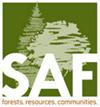Forest-Based Employment in the Southern United States amidst the COVID-19 Pandemic: A Causal Inference Analysis
IF 1.5
4区 农林科学
Q2 FORESTRY
引用次数: 0
Abstract
Abstract In response to the COVID-19 pandemic, some governments instituted mandatory stay-at-home policies. As these policies made exceptions for essential industries such as the forest sector, it is not clear a priori whether and how these policies would affect forest-based employment. This study examined the effect of mandatory stay-at-home orders on employment in the forest sector in forest dependent counties in eleven southern states in the United States. We estimated panel event study models in addition to difference-in-difference models to evaluate the policy effects with respect to initial treatment as well as average effects to the treated counties during treatment. We found that employment in wood product manufacturing was lower on average in counties under a lockdown order compared with employment in counties without an active order. We also found that employment in the aggregate forest sector in counties that implemented the policy was significantly lower than employment in counties without the policy up to 9 months following initial enactment compared with the underlying difference between treated and control counties one month prior to treatment. Overall, our findings suggest that lockdown policies had a limited effect on employment in essential industries such as wood-based manufacturing sectors in the southern states. Study Implications: This study uses causal inference techniques to assess the effect of lockdown orders on forest-based employment in 11 southern states. Results suggest effects of lockdown orders were limited to the aggregate forest sector and wood product manufacturing, likely due to the rapid designation of the sector as essential and the reduced production of sawmills. The other industries within the sector were not significantly affected, implying that industries designated as essential may be more resilient to short-term shocks. These findings can be used to inform discussions on potential policy responses to future disasters, including how different interventions interact with one another.COVID-19大流行期间美国南部森林就业:因果推理分析
为应对新冠肺炎疫情,一些国家出台了强制性居家政策。由于这些政策对诸如森林部门等重要工业有例外规定,因此不清楚这些政策是否以及如何影响以森林为基础的就业。本研究考察了美国南部11个州依赖森林的县的强制性居家令对森林部门就业的影响。除了差分模型之外,我们还估计了小组事件研究模型,以评估政策对初始治疗的影响以及治疗期间对受治疗县的平均影响。我们发现,在实施封锁令的县,木制品制造业的就业率平均低于没有实施封锁令的县。我们还发现,在政策实施后的9个月内,实施该政策的县的总体林业部门就业率显著低于未实施该政策的县,而在政策实施前1个月,实施该政策的县与对照县之间的潜在差异则明显低于未实施该政策的县。总体而言,我们的研究结果表明,封锁政策对南方各州木材制造业等关键行业的就业影响有限。研究含义:本研究使用因果推理技术来评估11个南部州的封锁令对森林就业的影响。结果表明,封锁令的影响仅限于整个森林部门和木制品制造业,可能是由于该部门迅速被指定为必不可少的部门,以及锯木厂的产量减少。该部门内的其他行业没有受到重大影响,这意味着被指定为关键行业的行业可能更能抵御短期冲击。这些发现可用于讨论对未来灾害的潜在政策反应,包括不同的干预措施如何相互作用。
本文章由计算机程序翻译,如有差异,请以英文原文为准。
求助全文
约1分钟内获得全文
求助全文
来源期刊

Forest Science
农林科学-林学
CiteScore
2.80
自引率
7.10%
发文量
45
审稿时长
3 months
期刊介绍:
Forest Science is a peer-reviewed journal publishing fundamental and applied research that explores all aspects of natural and social sciences as they apply to the function and management of the forested ecosystems of the world. Topics include silviculture, forest management, biometrics, economics, entomology & pathology, fire & fuels management, forest ecology, genetics & tree improvement, geospatial technologies, harvesting & utilization, landscape ecology, operations research, forest policy, physiology, recreation, social sciences, soils & hydrology, and wildlife management.
Forest Science is published bimonthly in February, April, June, August, October, and December.
 求助内容:
求助内容: 应助结果提醒方式:
应助结果提醒方式:


